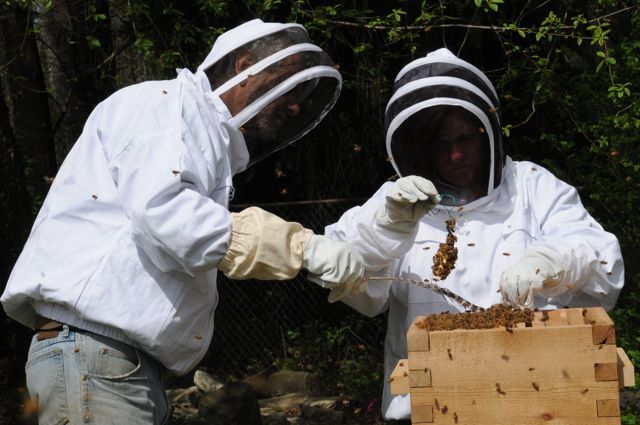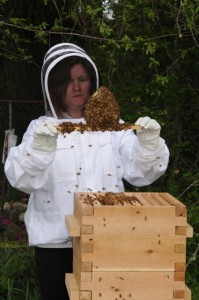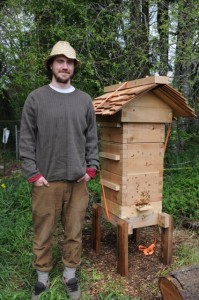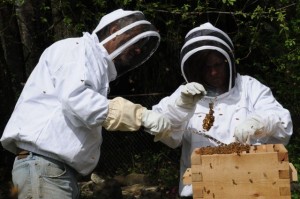
By Lisa Herrick
 Bees have been making headlines in recent times. Most of the attention has focused on Colony Collapse Disorder (CCD), the massive disappearance of bees that has been disastrous for commercial beekeepers worldwide. Yet just as newsworthy and critically important for the survival of bees is biodynamic and natural beekeeping. The South Sound Bee Guardians are a local example of people who are providing bees with a nurturing environment in which to thrive on their own.
Bees have been making headlines in recent times. Most of the attention has focused on Colony Collapse Disorder (CCD), the massive disappearance of bees that has been disastrous for commercial beekeepers worldwide. Yet just as newsworthy and critically important for the survival of bees is biodynamic and natural beekeeping. The South Sound Bee Guardians are a local example of people who are providing bees with a nurturing environment in which to thrive on their own.

The Guardians are an assortment of local beekeepers and honey bee advocates, with intentions to recreate strong genetic populations in bees while educating the local community on the variety of hive designs and the importance of letting bees swarm. All this to save the bees.
Tiffany Korn, a South Sound Bee Guardian member explains, “What we have done over the last 100 years has narrowed the bees survivability. Wild survivor bees have DNA within them that informs them how to deal with mites and toxic chemicals.” Biodynamic and natural beekeeping is an approach which respects the integrity of the colony. Its aim is to minimize stress factors and enable bees to develop in agreement with their true nature. Bees are allowed to build natural honeycomb (instead of supplying pre-made wax foundation sheets), swarming is acknowledged as the main way to rejuvenate and reproduce a colony, the queen is permitted to move freely throughout the hive and sufficient honey is retained in the hive to provide for the winter.
Korn maintains a Warre’ hive at the Olympia Waldorf School. “Warre’ hives honor the bees natural way of being while offering a low maintenance approach. The Warre’ hive is easy for anyone to have in their backyard,” Korn shares. “The hive is located at the school because beeswax is near and dear to the hearts at Waldorf. It is used in the paint, crayons and pencils.”
I met Korn, the Waldorf Management Team, and Evergreen State College students from Professor Sarah Williams’ Seeds, Beads, Bees and other Biodynamical Processes class many of whom are members of the Evergreen Bee Club when Korn was opening up the hive to find out whether the queen had come out of her cage. The package bees had come from different hives and the queen was put in a cage to give them time to get used to her.

Korn, who also has a top bar hive in her backyard comments that typically she would just wear a netting over her face when working with her bees as smoke causes great alarm to the bees. However, on this particular day she wore a suit because she would be lifting out the comb that the bees built and handling the queen. Her intent was to get in and out as fast and delicately as possible as to not stress the hive.
Three factors contributed to it being a good time to go in to the hive. The bees were newly placed in the hive, there was not yet brood growing in the honey comb and it was a warm sunny day with most of the bees foraging.
Korn emphatically shares that the key to the bee’s recovery is to re-energize their genetics through the re-diversification that happens from swarming and allowing the queens to naturally mate. A bee swarm is the natural reproductive process that honeybees go through. The bees gorge themselves on honey. They leave the hive for a temporary resting place while scouting bees look for a new home. Their natural hive is an empty tree. Regrettably, the majority of swarms (estimated 70%) will die because they are not able to find a home in the approximate three days the honey lasts.
Honeybee swarms can be frightening yet swarming is a time when bees are the least aggressive. During swarming, the bees are not protecting their hive and it is difficult for them to project their stingers with their bellies full of honey. They are in their most peaceable state when in a swarm.
The South Sound Bee Guardians are strong proponents of caring for bees in a simpler manner and in more natural hive designs. They are committed to allowing bees to maintain strong immune systems through organic practices and methods that do not overly stress the colonies. South Sound Bee Guardians offer beekeeping classes and low cost workshops at Arbutus Folk School on building various styles of bee hives. They also are able to save swarms by moving them to a safe environment.

“We want to educate people on natural, organic, biodynamic beekeeping and help them have access to low-cost hives and receive swarms for those hives so that they can have the wild genetics in their neighborhood. We want to show that almost anyone can successfully care for bees,” Korn remarks.
The queen was out of her cage. The bees had been feeding and caring for her. Korn was pleased with the happy humming of the hive while she shared her favorite quote – “Rather than having one beekeeper keeping 10,000 hives we need 10,000 people keeping one hive.”
Click here to learn more about the South Sound Bee Guardians or call their swarm line at 360-529-9606 to help a swarm find a home. Learn more about the status of bees from Rudolf Steiner.




















































